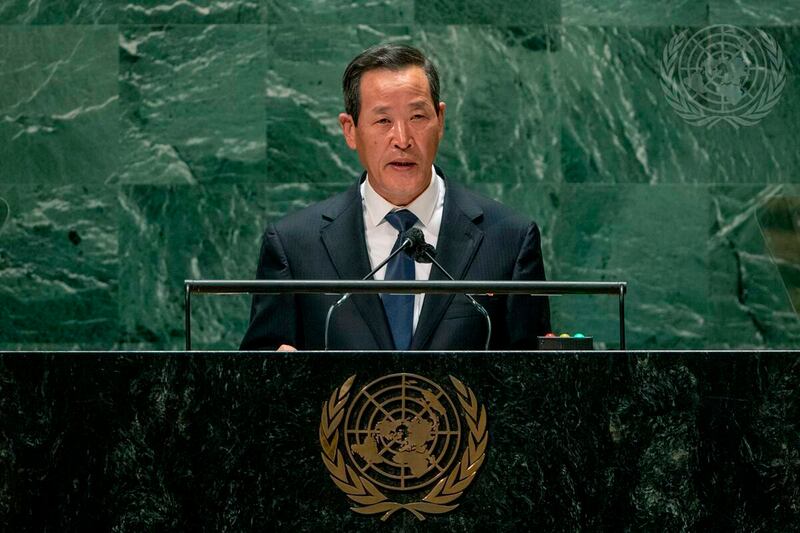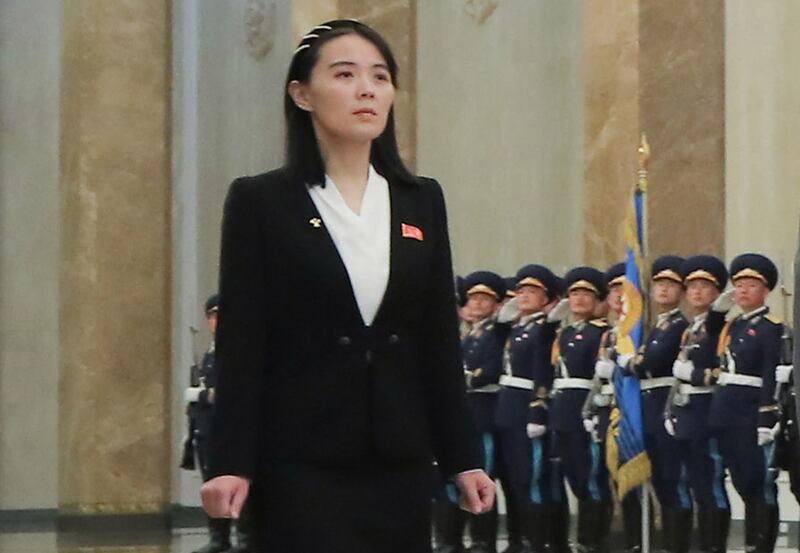North Korea has served up a mix of three missile tests in a month, boilerplate harsh criticism of the U.S., and rare semi-conciliatory words from the sister of leader Kim Jong Un – all aimed at getting out from under international economic sanctions, analysts say.
The state-run Korean Central News Agency (KCNA) reported Wednesday that Pyongyang tested a new hypersonic missile, suggesting that it could deliver a nuclear payload. The test followed the launch of long-range cruise missiles capable of hitting Japan and a ballistic missile fired from a train.
Desperate for relief from international sanctions over its nuclear and weapons programs, Pyongyang is stepping up pressure on Washington and Seoul over denuclearization negotiations that have been stalled since the failed Hanoi Summit between leaders of the U.S. and North Korea in Feb. 2019.
The country’s fragile economy has been laid low by border closures and the suspension of all trade with China since Jan. 2020 to prevent the spread of the coronavirus pandemic. Pyongyang also faces strict trade sanctions imposed by the U.S. as well as the UN Security Council over its multiple nuclear and missile tests.
Tuesday’s hypersonic missile launch came shortly before Pyongyang’s envoy to the United Nations blamed the nuclear dispute and inter-Korean tensions on Washington, saying the “main root cause lies in the hostile policy towards the DPRK.”

We have traversed an inevitable course of history as the U.S., the biggest nuclear power in the world, has been posing nuclear threats, antagonizing the DPRK for more than 70 years,” envoy Kim Song told the UN General Assembly.
The missile and verbal barrages came as Kim Jong Un’s sister, Kim Yo Jong, broke a long string of shrill attacks on Seoul with comments that appeared to welcome South Korean President Moon Jae-in’s recent call for the international community to “mobilize its strengths for the end of-war declaration on the Korean Peninsula.”
“I felt that the atmosphere of the South Korean public desiring to recover the inter-Korean relations from a deadlock and achieve peaceful stability as soon as possible is irresistibly strong. We, too, have the same desire,” Kim Yo Jong said in a statement.
Kim Jong Un’s inexperienced-but-fast-rising sister had earlier mocked Moon as a “parrot raised by America,” and criticized other speeches by the South Korean president as “sophism full of shamelessness and impudence.”
However, using the same phrase as her country’s UN envoy, Kim Yo Jong said that Seoul needed to drop its “hostile policy” to pave the way for an improvement in relations.
“I won't predict here what will come: a balmy breeze or a storm,” she said.
U.S. based analysts told RFA’s Korean service that Kim Yo Jong was focused not so much on Moon as on reaching Washington through Seoul.
“North Korea is still trying to figure out how to engage the U.S. they have they've tried everything they can. They tried behaving themselves. They tried cruise missile and short-range missile tests,” said Ken Gause of the Virginia-based CNA think tank.
“Don't be confused about what they're talking about it in terms of some sort of security pact or end of the Korean War or anything. That's not what this is about. This is about sanctions relief,” Gause said.
The RAND Corporation’s Soo Kim said North Korea’s sincerity about wanting good relations with the South was “questionable.”

“The Moon administration may seek to persuade the U.S. to change its position on sanctions relief, but it’s unclear how receptive Washington will be to these efforts. We’ve not seen any North Korean behavior that warrants or merits sanctions relief -- in fact, we’ve seen the opposite in recent weeks,” she told RFA.
“So for the Biden administration to consider sanctions relief would, at this point, be rewarding North Korea’s bad behavior and even validating to Kim the efficacy of his actions,” she said.
A former U.S. ambassador to South Korea told RFA that Kim Yo Jong in her statements sidestepped the denuclearization issue entirely and called on the U.S. and South Korea to abandon what she called “hostile policies.”
“While there are reasons to be skeptical of the North's intentions, Kim Yo Jong's remarks and her comments on an end-of-war declaration could represent an opportunity for progress,” said Alexander Vershbow, who was the U.S. envoy to Seoul from 2005 to 2008.
“Seoul and Washington need to forge a unified response and explore whether the North is ready to resume dialogue, including on denuclearization, on mutually acceptable terms,” he said.
A White House spokesperson told RFA that the hypersonic missile launch was a violation of resolutions by the UN Security Council and said Washington would consult with allies on next steps.
“We are prepared to meet with the DPRK without preconditions. We hope the DPRK will respond positively to our outreach,” said a spokesperson for the U.S. State Department.
Rep. Michael McCaul said the launch was the “Kim regime’s latest ploy.”
“North Korea’s nuclear belligerence is what drives instability on the Korean peninsula - not actions by the U.S., South Korea, Japan, and other partners to defend ourselves,” said McCaul.
“Agreeing to demands for concessions, right after North Korea restarted plutonium production and weapons testing, would be telling the Kim regime that nuclear belligerence achieves results,” he said.
Reported by Sangmin Lee and Hye Jun Seo, RFA’s Korean Service. Written in English by Eugene Whong.
